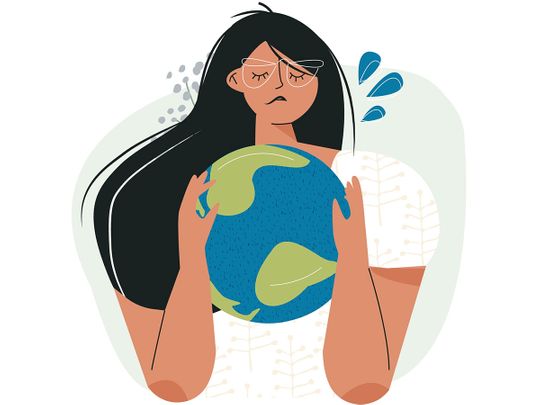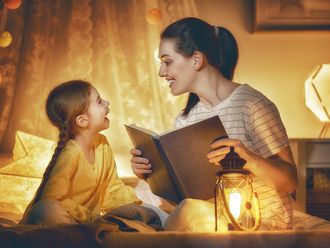
Each night, the 11-year-old girl would lie awake late into the night and wonder what would happen to the world. Come story time, she spoke of disasters and fears of flood and famine. It alienated her from her friends, who hadn’t given the health of the world much thought, and caused her rage when they made their carbon footprints bigger. “She,” explains, Dr Marwa Abd El Hamid, Psychologist at UAE-based Lifeworks, “…had eco-anxiety.”
“During my discussion with the mother, we discovered that her daughter was following the headlines about global warming, and she saw disturbing images on social media, all of which left her imagination running wild, and she even struggled to make her mind deal with this frightening information,” she adds.
This term eco-anxiety was coined by an Australia professor by the name of Glenn Albrecht. He explained it as: “The existential pain experienced when the place where one resides is subject to environmental degradation.”

The psychological state of a person interacts with the four seasons, and therefore, human mental health is directly affected by the climate.
This sort of anxiety has a lot of anecdotal evidence, but so far hasn’t made it to an official diagnosis manual. However, for those who know what they are looking for, explains Carla Chedid, Clinical Psychologist and Cognitive and Behavioural Therapist at UAE-based Openminds Center, it’s not difficult to identify. “Eco-anxiety affects people differently; it is a spectrum, going from low to severe.”
Sixteen-year-old Dubai student Aarushi Dahiya admits to being fearful of the Earth’s future. “I’m terrified. It’s impossible not to be, knowing that we are devastating the only place we know to support life in the universe. We have the facts. We are equipped to act on them. But whether it’s inertia or paralysis born of fear, we aren’t doing anything. It’s almost ironic. We have evolved to fiercely protect our offspring, but we cannot think beyond the immediate. Our grand designs cement our extinction as much as they ensure our comfort. The worst thing is that being hopeful now feels like being naïve,” she tells Gulf News.
Informed or panicked?
There’s a rather short walk from being informed about a subject to being paranoid about it.
Studies conducted in the US, says Chedid, found that if children are not aware about global warming, they will not worry. “Having more awareness about climate change, children under 16 would be [most affected] if they have an anxious trait, fear of death and unresolved beliefs about existence.
“In December 2021, a study was done in Brazil by Caroline Hickman showed that 59 per cent of respondents between 16 and 25 years old from 10 countries were (very or extremely worried) and 84 per cent were at least moderately worried. More than 50 per cent reported each of the following emotions: sad, anxious, angry, powerless, helpless, and guilty.”
Emotions and seasons- what’s the connection?
Human bodies regulate themselves in terms of temperature and this can affect moods too. Dr Marwa explains: “Sudden climate change changes the general mood and psychological state of most of the inhabitants of the globe, as the human brain (mediated by the heat centre in the frontal region of the brain) works to regulate the temperature of the body in order to adapt to external temperatures, and when climatic deviation or unfavourable climatic phenomena such as high temperatures, this area increases the secretions responsible for the temperature equation, which leads to nerve excitation, which is reflected in the psychological state.
“The psychological state of a person interacts with the four seasons, and therefore, human mental health is directly affected by the climate, and there is no evidence for this from what is known as ‘seasonal depression’ experienced by some, which confirms the link between climate and one’s psychological state, because many suffer symptoms such as feeling sadness, lethargy, mood disturbances, emotional fluctuations, the desire for solitude and unjustified grief, in addition to feeling lazy.”
Eco anxiety and being judgmental
Spanish/Mexican UAE-based expat Karina Galnares says eco-anxiety has shaped many years of her life. “In my late 20s became more evident shaping my lifestyle like no consumption of animals in my diet, recycling, awareness of product consumption and family planning.”
This self-regulation of consumption can have a bounce-back effect. “It upsets me emotionally to see people throw garbage, use plastic bags to buy a pack of gum, buy for the desire to have instead of need, consume animals when they have the option not to; all this makes me angry and immediately alters my mood,” she explains. “I constantly judge people and I need time to reframe and accept things as they are. I guess that is my learning to do.”

It upsets me emotionally to see people throw garbage, use plastic bags to buy a pack of gum, buy for the desire to have instead of need, consume animals when they have the option not to; all this makes me angry and immediately alters my mood.
Parent plans on hold
Fear of what is to come is also impacting Galnares’ vision of her family. “At this stage of my life, where there is a subtle influence and pressure from my social circle and even feeling my own relationship (marriage) is mature enough and has the resources to expand a family, fear of the future stops me from making that decision,” she says.
“I imagine a world of scarcity that will bring famine, poverty and violence as a repetitive and every time more aggressive cycle. And that idea of the future makes me decide not to bring another life to this world. I am afraid that my son/daughter will suffer the consequences of bad and null conservation and sustainability decisions from today’s society and institutions and at the same time fear that he/she will contribute to increasing such footprint.”
Signs of stress
Climate anxiety is for many a niggling sound that amplifies each time there is some catastrophic environmental news and dies down after the initial shock. But for some, it can be an overwhelming feeling. It depends, says Chedid, on a person’s emotional predisposition and vulnerability.
It may present as, explains Chedid:
- Sadness,
- Anxiety,
- Sleeping disorders,
- Post-traumatic stress disorder
“If a child has witnessed a climate disaster such as flooding, extreme cold or heat waves, he or she might exhibit symptoms of [trauma],” she says.
Dr Catherine Frogley, Clinical Psychologist and Education Lead at UAE-based The Lighthouse Arabia, adds that parents should keep a watch for signs of:
- A significant change in their child’s thoughts, feelings or behaviours
- The changes are persistent, i.e. lasting more than a few days
- Having a significant impact on the child’s ability to function in their normal day to day life, such as going to school, being with friends etc.
Suspect eco-anxiety behind your child’s sullen behaviour?
Dr Frogley suggests taking the following remedial measures:
Listen and validate: The most important step a parent can take is to listen and validate their child’s concerns. Even if you don’t agree with them or you see things differently, acknowledge that this is a very real fear to them and that you understand it.
Do your bit: You might also want to plan activities or actions as a family that you can take to do your bit to make a positive impact on the planet.
Offer hopeful data: You can also offer hope to young people by reminding them that there are so many scientists, organizations, governments and businesses working together to understand and address the climate crisis all over the world.
Dr Marwa adds some tips to keep in mind when talking to our children about environmental changes that cause them environmental anxiety:
Tell them the truth about climate change in a way the child or teen understands by providing the best and most reliable information about climate change mitigation and adaptation while raising your child's awareness of the problem. Experts say that building our children's confidence through reliable information about climate adaptation efforts is one way to allay fears.
Be aware of the type of information or news that the child or adolescent is exposed to and ensure its sources and validity. If a child asks questions about climate change, first find out what they have learned about it including whether they read harrowing stories online. Then say, “It's a great question, I want you to feel proud of these feelings, and because you wouldn't feel that if you didn't care about the planet.”
Changing mindset is changing beliefs and recognising the thoughts they have about their feelings of environmental change ‘that feeling you feel – it’s anxiety, it’s there to give you what you need to do powerful and important things’. A change of mindset also consists in realising that environmental anxiety is not a predictor of the end of life, but rather a call to action - a call to care - a call to accept change as change is universal - an invitation to learn about their abilities and the way they respond that can make a difference.
Avoid worrying your children excessively, as this will not serve any purpose. Talking in a negative way or talking about our fears as adults in an illogical way may lead to conveying these feelings to them but will also lead to increased anxiety in our children, and then they will not be able to face or deal with these feelings. Let them look for the positive in any circumstance, working on emotional regulation in the face of one's impulses, developing resilience in the face of adversity, etc. Eco anxiety can be reduced by reminding your child that there are plenty of people working on solutions that make the world a happier, healthier, and safer world.
Parents can also introduce specific activities that children may participate in to make a positive contribution to the planet. This can include participating in local environmental clean-up efforts or taking children for walks in nature and explaining the importance of caring for the ecosystem or modelling daily actions at home like recycling and reducing household emissions, to allow children to play a role in these household efforts.
Spending time in Nature as a family is one of the many actions to manage environmental distress in children (such as planting seeds, creating a small garden, or jogging and picking up plastic from the ground) and having conversations with your children about climate change.
Parents can also take them on a climate walk, and they can also wear their favourite superhero robe or costume to make it more fun.
Support groups of friends (for teens) who share the same interests or have our kids have some friends who want to make the world better for people, animals, or the environment, and start making their group and plan what they want to do to feel more in control, optimistic. Enhance their flexibility, through the active participation of thoughts and feelings, for example, if there is a problem in your child’s area that you feel resentful about, make them talk about it with their friends and try to know how you can help, and perhaps you can suggest some solutions such as writing messages about this topic.
Children and teens have the potential to inspire so always support their desire to make lifestyle changes and help them to better themselves and ease their fears by taking the right steps.
At the age of 14-16 years, adolescents are approaching the age of effective responsibility in society. Working and participating in community and voluntary activities may also help mitigate one of the societal risks of environmental anxiety, the fear of environmental crisis can be diminished if shared with others and can lead to positive changes.
After severe weather events, check with your child or teen about any concerns and provide additional support if needed.
Sophia Kee, a 36-year-old mum of two, says: “There are many ways to live sustainably - but the key is talking to your children about the choices you make as a family.”
For Galnares, what’s helped quell her anxiety is practicing mindfulness. “A constant practice of meditation and trying to live in full awareness brings me back to a mental state of acceptance. I remember the importance of not judging the process of others, and instead of trying to convince them, treat them with kindness and compassion. I focus on what I, as an individual, can do to live more sustainably and trust that my example inspires others.”
Have a story to share? Write to us at parenting@gulfnews.com








